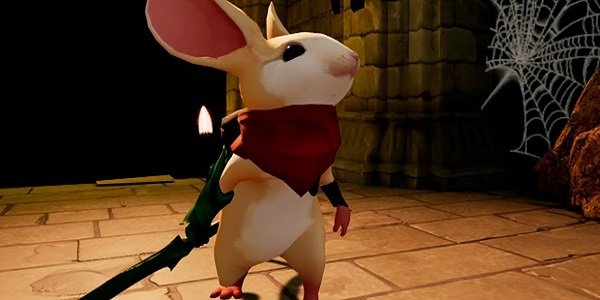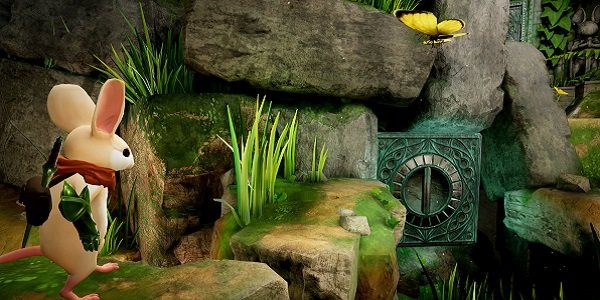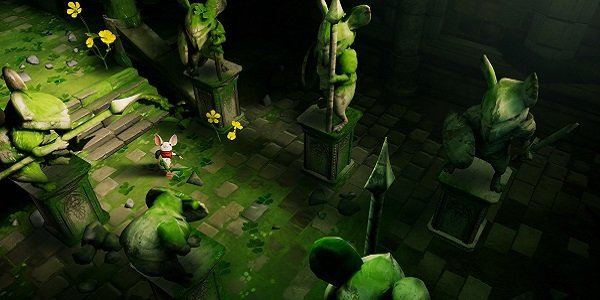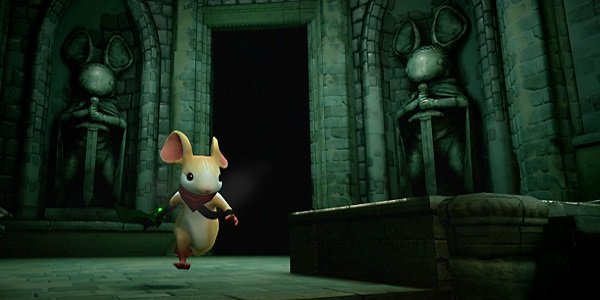Moss Review: Virtual Reality Done So, So Right

Leaning forward, craning my head down, I come face to face with Quill, an adorable mouse with a scarf around her neck and a sword in her hand. Having just worked together to dispatch a small army of mechanized insects, Quill smiles up at me and raises her paw. I reach out with my controller, giving her a high five. Moss, for PlayStation VR, is utterly enchanting.
Moss is most easily described as a fairy tale, only one that the player gets to take an active role in telling. The game opens on a massive library with an unassuming book resting on a table in front of you. As you start to turn the pages, a story of epic battle unfolds; one that sees an entire race of woodland creatures forced out of their fortified city and into exile. The player's part in the story begins many years later, on the outskirts of the quaint village those displaced critters now call home. The adventurous Quill has stumbled upon a mysterious piece of glass that's said to hold great power. Before you know it, Quill's uncle finds himself in a spot of trouble, forcing your tiny friend to venture through forbidden lands in the hopes of rescuing him.
As "The Reader," you soon learn that you have the ability to influence Quill, guiding her along paths, up and over obstacles and into battle. At the same time, you'll be manipulating various parts of the environment; pushing, pulling, twisting and sliding all manner of objects in order to help Quill move from one page of her story to the next.

At its heart, Moss is a puzzle platformer with some brief bursts of combat thrown in for good measure. The objectives start out nice and simple, but eventually grow in size and complexity. What sets Moss apart from similar games is that everything here was clearly built from the ground up with virtual reality in mind.
The regions you'll visit range from woodland temples to forgotten ruins and even a raid on the castle Quill's people used to call home. Each locale has been lovingly crafted with a sometimes staggering attention to detail, all ready to be explored by a brave little mouse and her trusty companion, the ever-present Reader.
Each page of the adventure is a diorama, one you can fully explore simply by leaning into the world and seeing what secrets it hides. Throughout the four-hour campaign, I found myself leaning back to get a wider view of the forest, circling in from the side to peek around a crumbling pillar and craning way down to see where a low staircase might lead.
Even after playing in VR for more than a year, games like Moss continue to surprise and delight me. Early on in the game, I entered a page of the adventure that included an environment several stories tall. "I can barely see that top floor," I thought to myself. "How the heck am I supposed to figure out where that path leads?"
Your Daily Blend of Entertainment News

My problem was that Moss' environments are so beautifully realized that I frequently forgot that I wasn't actually hunkered in a corner, forced to observe from whatever angle the developer had initially given me. Up to this point in the game, I had been careful to look around objects and duck under obstacles out of fear of "bumping my head." Wanting a better view of the higher platform, I finally stood up from my couch and marveled all over again at the wonders of VR gaming. There was plenty to see up there, so long as I was willing to move around move and take the time to look.
Moments like this are peppered throughout Moss. Maybe I'm too easily impressed, but I couldn't get enough of leaning super far into the world in order to get a better view of a mouse-sized tavern, beautifully lit church or a statue of a mouse riding a squirrel into battle. In the middle of the city on the outskirts of the castle, I rose like some clumsy kaiju, towering over the area I was supposed to be helping Quill explore in order to see the surrounding streets and alleys that the team at Polyarc thankfully took the time to create, just in case someone got curious enough to stand up and take a gander.
All of those lovely, frequently awe-inspiring visuals are complemented by an equally fantastic soundscape. I frequently found my head snapping to the left or right at the sound of a twig breaking or a crow taking flight. Water babbled in a nearby stream and Quill's padded footsteps echoed off of endless corridors. A sweeping score punctuates all of the biggest moments while a pitch-perfect narrator keeps the story moving, performing the voice of each character like a parent reading a bedtime story to a child who refuses to go to sleep.

I've been vague about the game's mechanics simply because discovering all of the ways you can interact with Quill, the world and even her enemies is a large part of the fun in Moss. Gameplay alternates between quiet moments of puzzle solving, brief arena battles and, even better, sections of gameplay that require you to manage Quill, the world and her opponents all at the same time. The game frequently requires juggling several activities at once, which proves to be a delight thanks to some spot-on controls.
Moss is, without question, my favorite VR experience to date. There's an impressive amount of craftsmanship on display here, with Polyarc going the extra mile to make every scene, every encounter, feel like it is part of a grand adventure on a minuscule scale. Most of the must-play VR experiences are first-person shooters because, let's face it, you've got a piece of tech strapped to your head and that makes the most sense. Moss proves that there's plenty of room to grow in this space, offering an experience that's familiar and wholly new, all at the same time.
Moss is a quintessential VR experience. While this past year has been filled with some great VR games, most have felt like either glorified tech demos or experiences that would have worked about as well on a television screen. That's not an insult, as that kind of experimental period is expected with such new technology. But Moss steps forward and confidently breaks that mold, something I'm looking forward to seeing even more developers do now that Polyarc has set such a strong example. I wouldn't have minded a longer adventure, or maybe some beefier boss encounters, but Moss' minor faults pale in comparison to its numerous successes.
Growing up, I was first drawn to video games because they made me feel like I was performing a kind of magic; influencing a world that exists in some other place and some other time. Moss serves as a welcome reminder that magic still exists.
This game based on a download copy of the game provided by the publisher.
Staff Writer for CinemaBlend.

